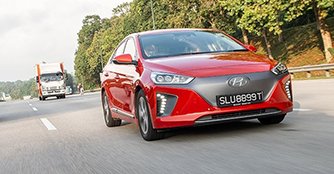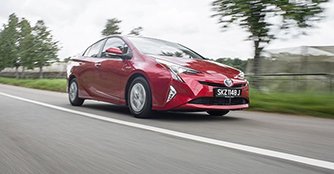All-electric ComfortDelGro cabs hit the roads in trial
19 Jul 2018|4,226 views
The two Hyundai Ioniq Electric saloons will be the first battery-powered vehicles to enter the mainstream taxi fleet. That means the operator pays full taxes for them, unlike a fleet of tax-exempt BYD taxis plying the roads here under a research grant. Ms. Tammy Tan, spokesman for ComfortDelGro, said the two electric Hyundais will be on a year-long trial. Like all previous trials, the operator may buy more if results prove favourable.

She said the fast-charging is via a direct-current station, approved by the Energy Market Authority, located at Hyundai agent Komoco Motors' premises in Alexandra Road. The station is open to the cabbies round the clock. "A fully-charged electric Ioniq taxi travels more than 200km, but the cost of charging it is only one-third of the cost of diesel for the same distance travelled," Ms. Tan noted.
The Ioniq Electric comes with advanced technologies such as energy recuperation and lane-keeping assist system, as well as autonomous emergency braking, smart cruise control and blind-spot detection.
ComfortDelGro's foray follows a growing trend towards electrification. According to Land Transport Authority figures, there were 4,159 petrol-electric hybrid taxis on the road as at the end of last month. These cabs now account for 20 percent of Singapore's taxi fleet of around 21,000. In comparison, the penetration rate for passenger cars is far lower, with less than four percent of the population being partly or fully electric.

"This is good news. Generally speaking, diesel emissions of particulate matter and nitrogen oxides are higher than (those of) petrol and more so against hybrids. So we can see immediate and prevalent improvement in on-road pollutant readings. As explained before, the World Health Organisation has stated that particulate matter and diesel emissions are both carcinogenic. So this is another plus point."
Meanwhile, TransCab, the second-largest cab operator here, has ordered its first fleet of petrol-electric Toyota Prius taxis. TransCab General Manager Jasmine Tan said the order comprises 500 vehicles, which will start plying from October.
Observers said since taxis clock at least three times as many kilometres as the average family car, the benefit of converting them to less pollutive models is multiplied. Just five years ago, there were only 662 hybrid cabs here, which made up 2.4 percent of the taxi population.
Mr. Joe Nguyen, 45, an early adopter of electric cars here, said, "This move makes complete sense as electric vehicles are cheaper to run, and there are lower maintenance costs associated." The Senior Vice President of an Internet research firm, who owns the first Tesla here, added, "But obviously, the operator will have to invest in staff and systems to support electric vehicle systems like batteries and electric motors."
The two Hyundai Ioniq Electric saloons will be the first battery-powered vehicles to enter the mainstream taxi fleet. That means the operator pays full taxes for them, unlike a fleet of tax-exempt BYD taxis plying the roads here under a research grant. Ms. Tammy Tan, spokesman for ComfortDelGro, said the two electric Hyundais will be on a year-long trial. Like all previous trials, the operator may buy more if results prove favourable.

She said the fast-charging is via a direct-current station, approved by the Energy Market Authority, located at Hyundai agent Komoco Motors' premises in Alexandra Road. The station is open to the cabbies round the clock. "A fully-charged electric Ioniq taxi travels more than 200km, but the cost of charging it is only one-third of the cost of diesel for the same distance travelled," Ms. Tan noted.
The Ioniq Electric comes with advanced technologies such as energy recuperation and lane-keeping assist system, as well as autonomous emergency braking, smart cruise control and blind-spot detection.
ComfortDelGro's foray follows a growing trend towards electrification. According to Land Transport Authority figures, there were 4,159 petrol-electric hybrid taxis on the road as at the end of last month. These cabs now account for 20 percent of Singapore's taxi fleet of around 21,000. In comparison, the penetration rate for passenger cars is far lower, with less than four percent of the population being partly or fully electric.

"This is good news. Generally speaking, diesel emissions of particulate matter and nitrogen oxides are higher than (those of) petrol and more so against hybrids. So we can see immediate and prevalent improvement in on-road pollutant readings. As explained before, the World Health Organisation has stated that particulate matter and diesel emissions are both carcinogenic. So this is another plus point."
Meanwhile, TransCab, the second-largest cab operator here, has ordered its first fleet of petrol-electric Toyota Prius taxis. TransCab General Manager Jasmine Tan said the order comprises 500 vehicles, which will start plying from October.
Observers said since taxis clock at least three times as many kilometres as the average family car, the benefit of converting them to less pollutive models is multiplied. Just five years ago, there were only 662 hybrid cabs here, which made up 2.4 percent of the taxi population.
Mr. Joe Nguyen, 45, an early adopter of electric cars here, said, "This move makes complete sense as electric vehicles are cheaper to run, and there are lower maintenance costs associated." The Senior Vice President of an Internet research firm, who owns the first Tesla here, added, "But obviously, the operator will have to invest in staff and systems to support electric vehicle systems like batteries and electric motors."
Latest COE Prices
December 2025 | 2nd BIDDING
NEXT TENDER: 07 Jan 2026
CAT A$109,501
CAT B$115,102
CAT C$77,003
CAT E$119,000
View Full Results Thank You For Your Subscription.



















